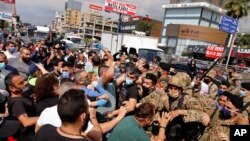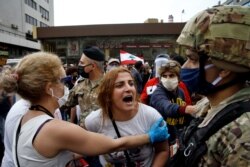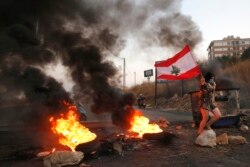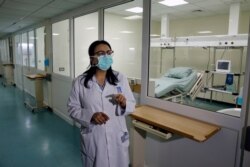Lebanese have taken to the streets again, both in cars and on foot, to protest the country’s deteriorating economic situation, despite a lockdown and curfew imposed because of the coronavirus. The demonstrators say they’re forced to choose between dying of hunger or disease. Analysts predict a “full-fledged catastrophe” as huge pressure builds on the working- and middle classes and refugees who are the most vulnerable.
Warmer spring weather and job losses over the lockdown have brought angry Lebanese back to the streets in protests throughout the country. Some are blocking highways with burning tires.
Health Minister Hamad Hasan warned that the demonstrations posed “an imminent danger that will undermine all the achievements that have been made” in containing the pandemic. He urged protesters to be careful, keep a distance and wear masks, so they don’t “transfer the virus from the streets to their families, while expressing pain [felt by] every Lebanese citizen.”
Nationwide protests first erupted last October against the entire ruling class, accusing it of corruption and squandering public money.
COVID-19, the disease caused by the coronavirus, has compounded Lebanon’s financial woes. The Lebanese have seen the value of their savings tumbling, their currency plummeting, painful price increases and job losses.
“Lebanon in real and practical terms was almost broken before the coronavirus reached it — a country completely in collapse and bankruptcy," said Joseph Bahout, is an academic fellow in the Middle East program at the Carnegie Endowment for International Peace. "Now, different phases in the liquidity crash, the run towards the dollars, the hopeless policy of the central bank which tried to defend the lira and then the coronavirus completely shot the final bullet in economic activity. Now, we’re waiting to wake up after the coronavirus on a full-fledged catastrophe in the country.”
“All of this means that there is a huge pressure on the working class and middle class in Lebanon, and of course, on refugees and those are the most vulnerable," said Nasser Yassin, the interim director of the American University of Beirut’s Issam Fares Institute for Public Policy and International Affairs. "We’re going to see a very, very dire situation in terms of people losing jobs. Fifty-five percent of the Lebanese economy work in the informal sector. Around 97% of refugees work in the informal economy. Most of them, except the delivery sector, have been hugely affected by the lockdown and some have tried to break the lockdown to look for jobs and they’ve been faced by the police. This is one of the major repercussions.”
One silver lining is that Lebanon has managed to contain the coronavirus outbreak relatively well, Yassin says. So far,the health ministry has reported 710 COVID-19 cases with 24 deaths.













